 |
 |
森ビル株式会社
循環する生態系ネットワークの都市への実装を推進
株式会社ソニーコンピュータサイエンス研究所(本社:東京都品川区・代表取締役社長 北野宏明、以下ソニーCSL)は、森ビル株式会社(本社:東京都港区・代表取締役社長 辻慎吾、以下森ビル)が運営する六本木ヒルズの屋上庭園を舞台に、2019年11月より都市空間における協生農法に関する実証実験を開始します。
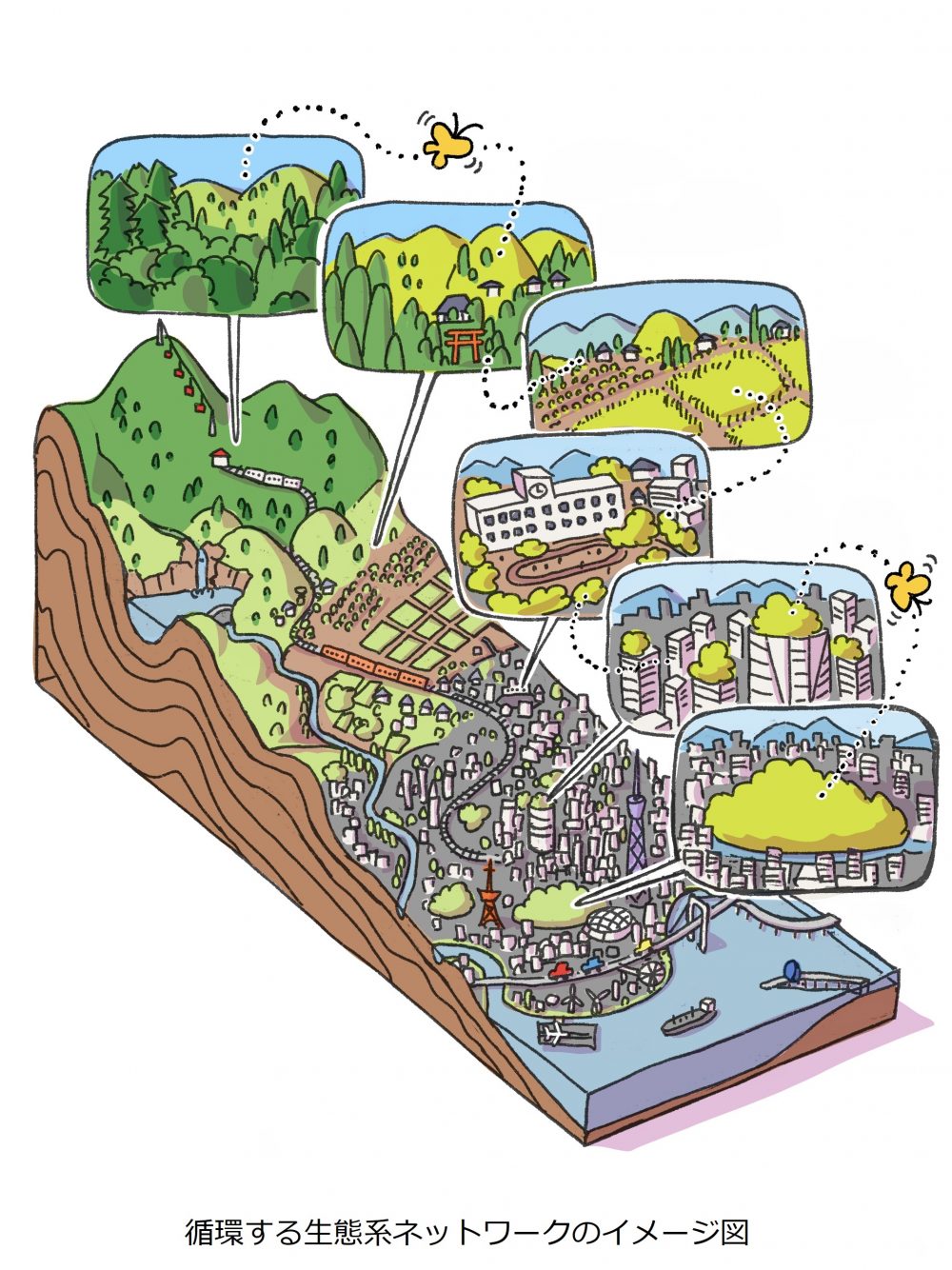
人類は長い期間、生産性と環境破壊のトレードオフの中で農業を営んできました。その結果、現代では農業の大規模化や単作化が進み生産性が著しく向上する一方で、農業を行なっている多くの土地で砂漠化などの土壌劣化が進行し、急速に環境破壊が進んでいます。
〇協生農法とは、生産性と環境破壊のトレードオフからの脱却を目指した新しい農法です。
多種多様な植物を混⽣・密⽣させることで、⼟地を耕さず、また肥料や農薬も⼀切使わずに、植物本来の特性を活かして⽣態系を構築し、⼟壌の機能を回復します。食料生産だけでなく、環境や健康に与える影響までも包括的に考慮した立体的な生態系の活用法であることが特長です。人間活動が加わることによって自然状態を超えて生物多様性・機能が高まった状態は「拡張生態系」と呼ばれ、学術的に定式化されています。
〇協生農法の植物育成は、既存の都市景観に変化をもたらします。
森ビルは、極力品種数を増やし生物多様性に配慮した都市緑化を推進してきました。協生農法の考え方を導入することで、さらに都市における生物多様性の促進できるほか、植物を育てながら同時に空気を清浄化したり、ヒートアイランドやゲリラ豪雨などの影響も緩和する様々な生態系サービスを、これまでより高いレベルで育める可能性が広がります。
今回の実験では、2015 年から行われている西アフリカでの実証実験をはじめ、今までに露地栽培で得た知見などを元に協生農法の導入と拡張生態系の実装を建物の屋上にて行います。具体的には六本木ヒルズけやき坂コンプレックスの屋上庭園に、3パターンの異なる土壌を用意した特別なプランター5個を設置。プランターには、野菜・果樹を中⼼に周囲に100種に上る植物種を配置し、⽣育状態の変化を観察します。プランター以外にも六本木ヒルズの屋上庭園の土壌に直に植えた露地栽培型には200種ほどの有用植物を配置します。
ソニーCSLは本実験を通して都市における協生農法の可能性を調査するだけでなく、六本木ヒルズに設置するプランター自体を循環する生態系のネットワークを体感するための装置と捉え、今後も様々な場所に多様な植生を展開し拡張生態系に包まれた都市の提案を行うとともに、本実験で得た知見をもとに開発する「協生理論学習キット」やワークショップなど、協生農法に関する学習のプラットフォーム化を目指します。
森ビルは、本実験を通して都市と自然が共生した、未来へつながる持続可能な都市づくりをさらに深化させるとともに、今後もヒルズを実証実験の舞台として様々なパートナーに提供して参ります。
<実験概要>
- 期間:2019年11月~2022年3月
- 場所:六本木ヒルズ
- 主催:株式会社ソニーコンピュータサイエンス研究所
- 協力:森ビル株式会社
一般社団法人シネコカルチャー - 内容:協生農法が屋上庭園において実現可能かを検証し、また、生物多様性の相互作用と生態系の物質循環を学習
するための「協生理論学習キット」の開発を行う。
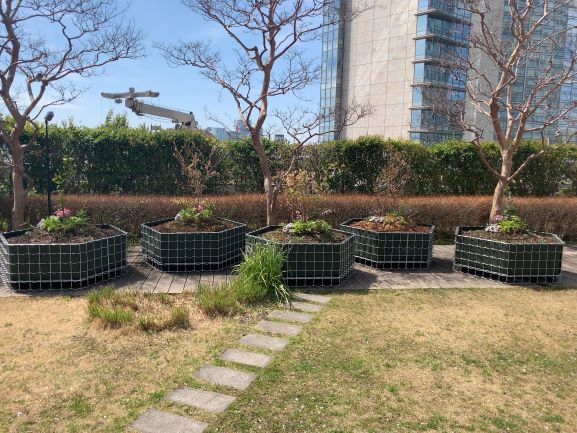 |
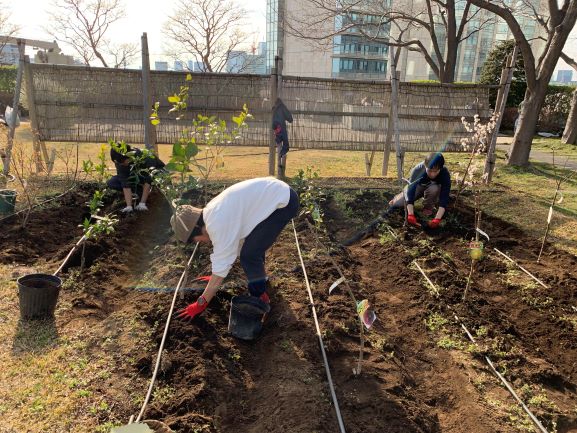 六本木ヒルズけやき坂コンプレックス 屋上の実験場の様子 |
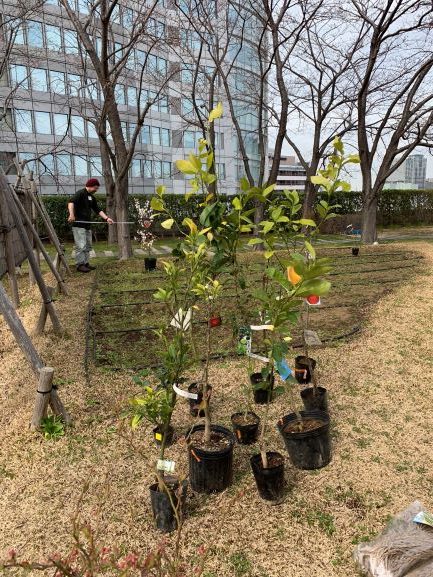 |
協生農法は食料生産と生物多様性の回復・増進を両立させる新しい手法として、環境や食料問題、途上国の貧困など、現代社会が直面する様々な課題を解決に導く可能性を秘めています。生物多様性を高い状態にしていくことは西アフリカなど砂漠化が懸念される地域に限定されず、都市を含む全球規模で取り組む必要のあるテーマでもあります。今回、森ビルのご協力のもと、屋上空間で実験することによって、協生農法を通した持続可能な社会を目指した様々な試みについて、多くの人が体感したり、学習する機会が増えることに期待しています。北野 宏明 (株式会社ソニーコンピュータサイエンス研究所 代表取締役社長・所長)
都市空間とは、古来より人間が物資と情報を集積してきた文明の基盤です。それは一方で人間の生活を自然の脅威から守り切り離すプロセスでもありました。その極まった形態として空高く高層化された六本木ヒルズの屋上に、現在喪失の危機に瀕している生物多様性を高度に集積した「拡張生態系」が出現する時、一体何が起きるのでしょう。それは単なる都市部における食料生産を超えて、周囲生態系に敷衍可能な生物資源と情報を高度に集積する新たな文明装置であり、これまでの社会的共通資本としての都市計画を超えて、人間の生活圏と生態系の循環が高度な形で融合する自然-社会共通資本の誕生が予感されます。舩橋 真俊 (株式会社ソニーコンピュータサイエンス研究所 リサーチャー)
森ビルは、未来の都市とライフスタイルのあり方を常に考え、「都市を創り、都市を育む」街づくりに取り組んできました。その中で、都市と自然の共生は、未来へとつながる持続可能な都市づくりに欠かせない、非常に重要なテーマです。 「人類の未来のための研究」を目指すソニーCSLが提唱する協生農法は、まさしく、これまでの都市と自然の共生のあり方を進化させる新たな思想です。私は、今回六本木ヒルズを舞台に行う、新しい植生に関する最先端の実験、実践が、これからの都市を育む上で大きな示唆を与えるものと確信しています。小笠原 正彦 (森ビル株式会社 取締役専務執行役員)
◇報道関係からのお問合せ先◇
| 株式会社ソニーコンピュータサイエンス研究所 担当:コミュニケーションオフィス 本條 陽子 Email:csl-pr@csl.sony.co.jp |
森ビル株式会社 タウンマネジメント事業部 担当:渡邉 茂一、山村 麻里惠、永田 倫 TEL:03-6406-6350 FAX:03-6406-6483 |
 |
 |
Mori Building Co., Ltd.
Towards Cities with Augmented Ecosystem Networks
Tokyo, Japan – Sony Computer Science Laboratories, Inc. ("Sony CSL," President and CEO: Hiroaki Kitano) today announced that, beginning from November 2019, it will launch an urban Synecoculture proof of concept trial at the rooftop gardens at Roppongi Hills run by Mori Building Co., Ltd. ("Mori Building," President and CEO Shingo Tsuji).
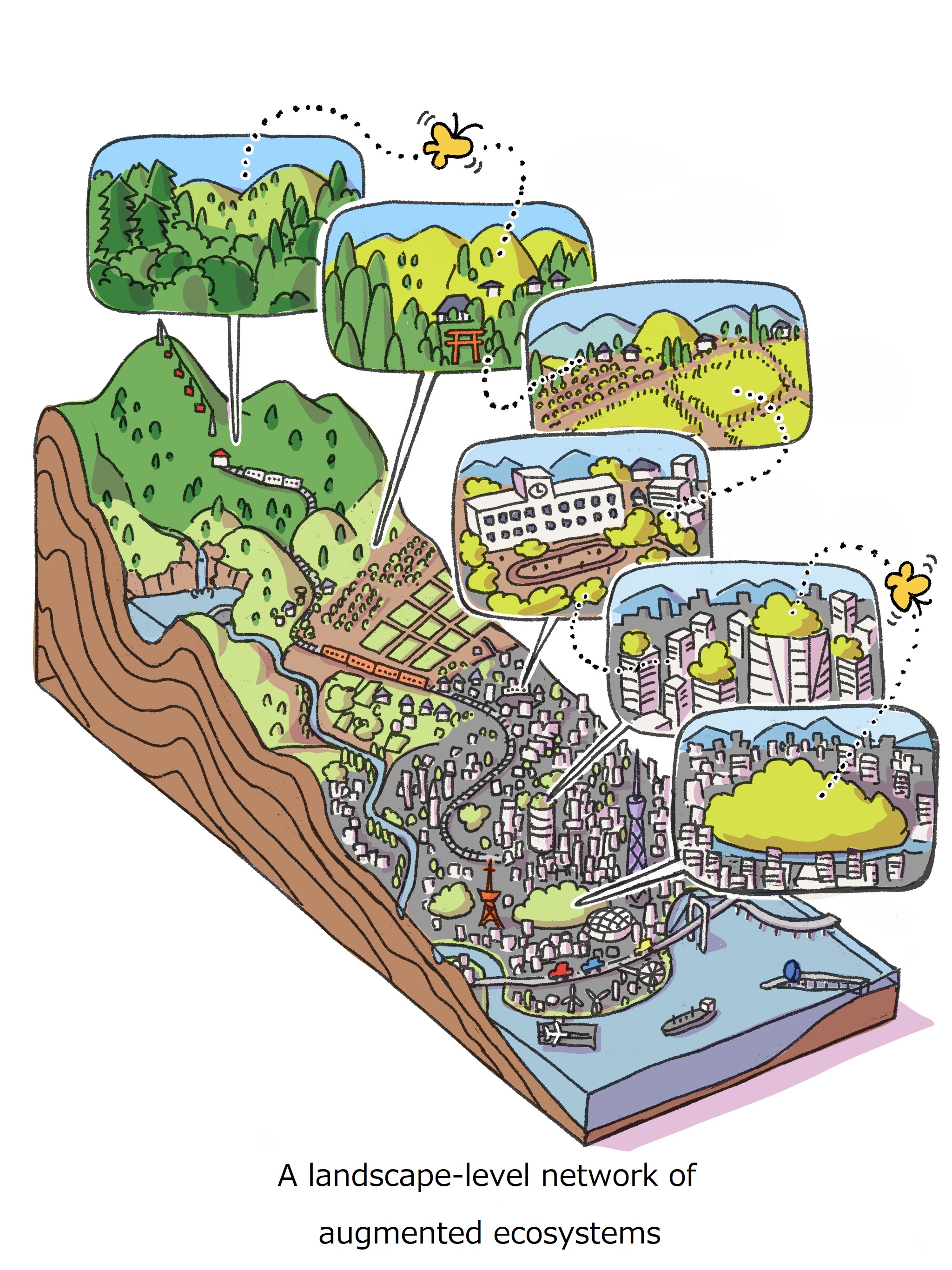
The history of agriculture involves a constant trade-off between productivity and environmental impact. While modern agriculture has achieved tremendous productivity growth through large-scale monoculture, this has also led to desertification and other forms of soil degradation in many regions, hastening environmental decline.
♦Synecoculture: Agriculture that overcomes the trade-off between productivity and environmental damage
By bringing together various species of plants/insects, Synecoculture is a method of open-field agriculture that – without the use of any plowing, fertilizers, agricultural chemicals, or anything else except for seeds and saplings – allows for the creation and management of ecosystems that bring out essential qualities of the plants growing in natural state and recover the functionality of the soil. Not solely for food production, Synecoculture uses a holistic method that has been designed to positively impact the environment and human health as well. The state of improving biodiversity and its functionality by surpassing an ecosystem's natural state through human assistance is called "augmented ecosystem" and has been formulated scientifically.
♦Plant cultivation through Synecoculture transforms existing urban landscapes.
Many urban tree-planting efforts use an extremely limited number of plant species. Adoption of the Synecoculture philosophy would promote biodiversity in cities, and bring many potential ecosystem benefits such as air purification and reducing the impact of heat islands and "guerrilla rainstorms" while also cultivating many different types of plants.
This latest experiment is based on the insight and experience into outdoor growing gleaned from proof of concept trials conducted in West Africa starting in 2015. It seeks to test the introduction of Synecoculture and ecosystem expansion on urban rooftops. More specifically, five special planters, using three different varieties of soil, will be installed on rooftop gardens in Roppongi Hills. These planters will contain over 100 species of plants, consisting primarily of vegetables and fruit trees, and their growth progress will be monitored. Separately from the planters, approximately 200 species varieties of useful plants will also be planted directly into the soil of open-air Roppongi Hills rooftop garden.
Through this experiment, Sony CSL will not only explore the possibilities for urban Synecoculture, but also views the planters themselves as a way of experiencing various ecosystem cycles in the raw. Moving forward, Sony CSL will continue to offer proposals for creating urban areas that feature augmented ecosystems in various locations. The knowledge gained from this experiment will also form the basis for the creation of a Synecoculture-related learning platform that will include "Synecoculture Principles Learning Kit," workshops, and more.
Mori Building hopes that this experiment will further deepen the creation of sustainable cities in the future that cities and nature harmoniously coexist, while also continuing to promote Roppongi Hills to various partners as a space for proof of concept trials.
<Trial Overview>
- Duration: November 2019 ~ March 2022
- Location: Roppongi Hills
- Sponsor: Sony Computer Science Laboratories, Inc.
- Partners: Mori Building Co., Ltd.,
Synecoculture Association - Overview: Explore whether Synecoculture is viable in rooftop garden and explore the development
of a "Synecoculture Principles Learning Kit" for learning about biological synergy
and ecosystem cycles.
 |
 Experiment at Rooftop garden at Keyakizaka Complex, Roppongi Hills |
 |
Synecoculture is a new method that achieves both food production as well as the recovery and improvement of ecological diversity, and it could be the key to solving several issues facing modern society such as environmental and food-related problems, poverty in developing countries, and more. A high degree of biodiversity is needed not only for areas threatened by desertification, such as sub-Saharan Africa, but is something that should be tackled on a global scale, including cities. Through collaboration with Mori Building, we hope to provide more chances for people to learn about and experience the various ways in which Synecoculture is striving to help create a more sustainable society.Hiroaki Kitano (President & CEO, Sony CSL)
Human civilizations have been concentrating resources and information in urban spaces since time immemorial. This process has at once protected human lifestyles from natural threats and also cut them off from nature. What, then, would happen when an augmented ecosystem, full of increasingly threatened biological diversity, appears on a rooftop in the skyscrapers of Roppongi Hills? This goes beyond simple food production within cities, and leads to the realization of a new civilizational tool for gathering high amounts of bioresources and information that could even be applied to transform the surrounding ecosystem towards a higher integrity. I feel that we are witnessing the birth of the fusion between human biospheres and natural ecosystems, of a shared capital between nature and society.Masatoshi Funabashi(Researcher, Sony CSL)
Mori Building is always considering the design the future for global cities and lifestyles, and has worked to create and nurture cities. To this end, we believe that harmonious coexistence of cities and nature is essential for building sustainable cities. I sincerely believe that this cutting-edge experiment in urban vegetation being conducted right here in Roppongi Hills will provide to be a major example and guide for city-building as we move forward.Masahiko Ogasawara(Director and Senior Executive Managing Officer, Mori Building Co., Ltd.)
♦For media inquiries:♦
| Sony Computer Science Laboratories, Inc. Yoko Honjo, Communication Office Email: csl-pr@csl.sony.co.jp |
Mori Building Co., Ltd. Moichi Watanabe, Town Management Department TEL: 03-6406-6350 FAX: 03-6406-6483 |